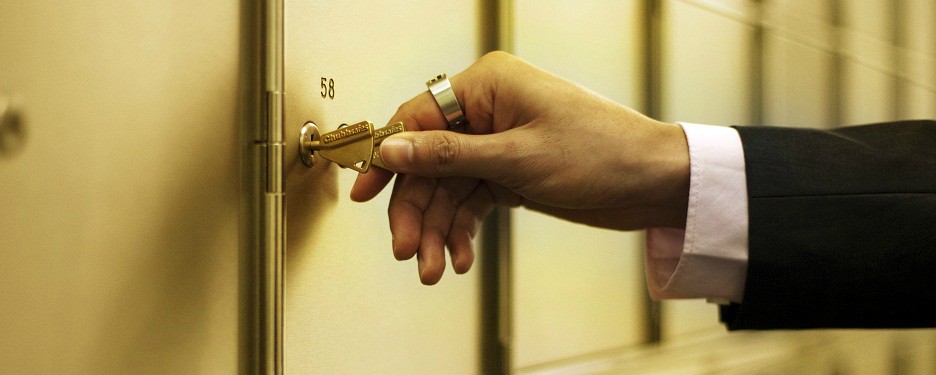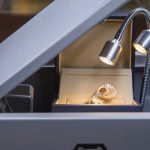What can you safely put in a Safe Deposit Box
Everyone has something to protect. For the aged homeowner, it may be an original copy of his will, or precious heirlooms he wishes to pass down to future generations. For the eclectic art collector, it may be her expensive, fragile art collection.
For different people, there are a variety of different needs and prized possessions to be kept away. And one of the best options for storage is a personal safe deposit box or vault, instead of deferring to bank vaults or home safes.
Safe deposit boxes are tough to crack against theft and environmental changes (which could spell bad news for fragile documents or paintings that need to be preserved). Safe deposit box consultant David McGuinn from Houston says that these boxes are still “the safest place” for one to store their valuables. That, and they are generally accessible round-the-clock, no matter what day it is in the week.
But what exactly are safe deposit boxes, and how do they work?
What is a Safe Deposit Box?
A safe deposit box, according to Investopedia, is usually located inside a bank and is used to store valuables. A financial institution rents out safe deposit boxes, and they can be accessed with keys, pin numbers or some other type of security pass. Valuables, such as documents and jewellery are placed inside, and customers rely on the security of the building and vault to protect those valuables.
Apart from banks, other institutions also offer safe deposit boxes; you just have to find the right one and be sure that they have a trustworthy insurance policy. Lastly, ‘many hotels, resorts and cruise ships also offer safe deposit boxes or small safes to their patrons, for temporary use during their stay. These facilities may be located behind the reception desk, or securely anchored within private guest rooms for privacy.’ (Wikipedia)

Differences between a safe deposit box and regular bank vaults and home safes
It might seem like the most convenient option to store one’s valuables and possessions in a regular bank vault, or even in a home safe. However, there are a multitude of reasons why electing for a safe deposit box may be the better option, especially with items that you intend to protect and preserve for a long time.
Bank vaults, to begin with, are not accessible round-the-clock and are instead at the mercy of regular banking hours. Banks close in the evenings, after which clients will not be able to access or withdraw their items and possessions should the need arise. And while home safes afford you this flexibility, they cannot completely accommodate to different storage needs. For example, having fragile, old paintings or old documents.
Additionally, in 2013, Hong Kong police observed a higher rate of home safe theft, and strongly encouraged the public to purchase deposit boxes instead. At the time, bank deposit vault numbers were also at an all time low.
As a result, more private vault storage options opened up in Hong Kong in a bid to meet the demand, proving that safe deposit boxes and vaults were much safer than storing valuables in one’s home safe. (South China Morning Post, July 2013)
Safe deposit boxes have, as a result, many advantages – flexibility and accessibility, as well as customisation options that allow you the most suitable environment to store your treasured possessions and fragile art. And furthermore, safe deposit boxes are not at the mercy of financial markets the way banks and institutions are. Should the market fail, banks will collapse – which may prove to make item retrieval difficult or near impossible.
But what can you put in a safe deposit box? And what should you avoid placing in it?
What can you put in a Safe Deposit Box?
Although the banks and other institutions that offer safe deposit box services are insured, it is important to note that the items kept in the safe deposit boxes are not. Hence, not all items are suitable to be kept in safe deposit boxes. It is also a generally good rule to follow to avoid storing items that you might need frequently, and on short notice.
Items that can be kept in safe deposit boxes:
• Valuable jewellery that you rarely wear, or intend to pass down to your descendants as an inheritance.
• Rare collectibles, especially those that should not be around children who run around the house.
• Important papers that you do not need to regularly access on short notice.
• Personal papers like your original birth certificate and your passport, if you are not prone to emergency travelling or travelling frequently for work.
And while safe deposit boxes have a high level of security that can protect your possessions, it is important to take note of the following to further ensure the integrity of your deposit box has not been compromised:
- Take photographs of whatever items you have stored into the safe deposit box to prove your ownership of your items in case of emergency or a mishap.
- Make sure that you always get to sign in or on a log when you decide to access your box, in order to maintain integrity.
- Ensure that key family members or relatives are aware that you have opened a safe deposit box, in the event that you pass away. This is so that your family members are able to retrieve the box on your behalf and retrieve your belongings.
What should you not put in a Safe Deposit Box?
1. Money
As tempting as it is to keep money that you do not need urgently in your safe deposit box, it is unwise to do so for three reasons. Firstly, money kept in a safe deposit box is not insured. Secondly, money kept in a safe deposit box does not yield interest like it will if it is kept in an interest yielding bank account. Lastly, in the event where you need the money urgently, you may be out of luck if your institution is not open.
2. Illegal Items
Illegal and dangerous items such as firearms should not go into your safety deposit box because they can be incriminating.
3. Spare Keys
Spare keys, especially your house’s spare keys, should not be kept in a safe deposit box. Imagine you lost your key and your safe deposit box key is tucked away somewhere in your room… Well, you know how that story goes.
After all that has been said, the bank or institution has the right to decide what they allow you to keep in the box you are renting. While some would allow you to keep cash in it, some would expressly prohibit it. Thus, read the institution’s policy carefully to be sure.
4. The one and only copy of your will
Much like storing spare keys, wills are crucial documents that should not be carelessly stored away – especially if you only have one copy.
When personal tragedy strikes, it may suddenly be difficult for your living relatives to retrieve your safe deposit box and its contents – solely because upon death, your deposit box will be sealed. Typical sign in processes to access these boxes require a co-signer. In your absence, however, retrieval can take a longer time.
This is why it is important to ensure you have more than one copy of your will, such that your last wishes can be fulfilled as soon as possible instead of being stonewalled by security concerns.
5. Passports
Items that you would frequently use should generally be kept out of your safe deposit box. One such example is your passport, especially if you are someone who happens to be a frequent flyer. It is unwise to store it in your deposit box, since you may need it on short notice once a trip is planned or a work trip has been delegated to you at the office.
Alternate solutions to keeping your passport safe could include using a home safe or storing it in a cabinet and keeping the key on you. Of course, here’s a caveat: if you are someone who does not travel more than once a year, you may consider placing your passport in the safe deposit box. But this varies from individual to individual.
Who can access your Safe Deposit Box?
This depends solely on you. You can decide to be the only one who has access, have a deputy, or grant others access to your safe deposit box.
It is also important to find out what happens to your box in case of death. Most times, peradventure you die, your safe deposit box is sealed until your attorney gets a right to open it. The speed of this process depends on the institution offering the box. This is one reason why private companies offering safe deposit boxes are often preferred to banks.
As stated earlier in this article, ensure that key family members are kept in the loop if you have a safe deposit box in order to facilitate with item retrieval should the worst happen. As always, it pays to be prepared.
Find out more about Ultra Vault’s Safe Deposit Box services.

